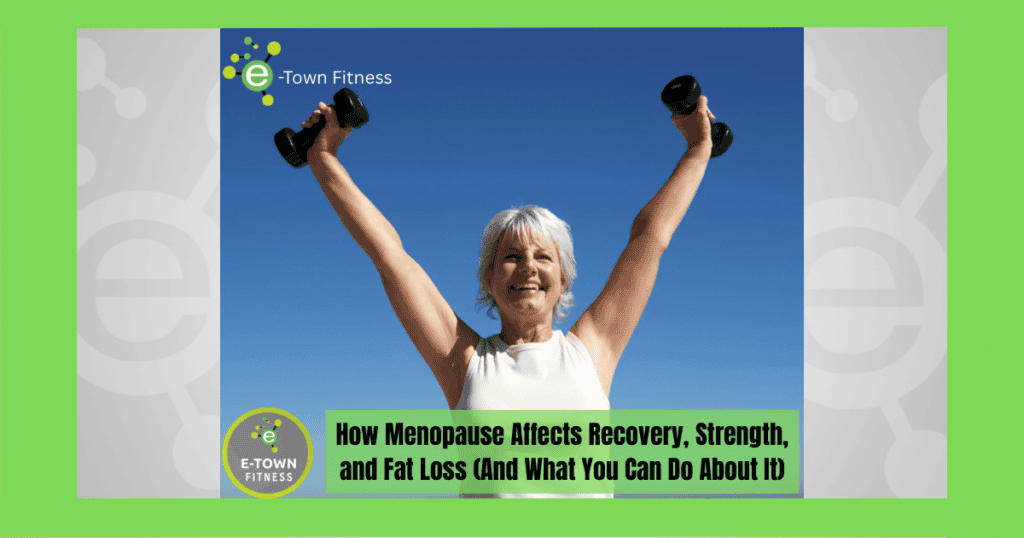How Menopause Impacts Recovery, Strength, and Results (And What You Can Do About It)
If you’re in your 40s or 50s and noticing that your body just isn’t responding to workouts the way it used to—you’re not imagining it.
Menopause and perimenopause can affect everything from energy and sleep to muscle recovery, joint comfort, and even your ability to lose fat. But that doesn’t mean you’re stuck. It just means your fitness approach needs to evolve.
At E-Town Fitness, we coach a large number of women navigating these changes—and we help them get stronger, leaner, and more energized with the right support.
🌡️ How Menopause Affects Your Body’s Response to Training
As estrogen and progesterone levels shift, your body goes through several changes that directly impact your workouts and recovery:
🔻 Slower Muscle Recovery
Your muscles may stay sore longer or feel more tender after training sessions. Inflammation can also increase, making recovery a bit more of a challenge.
🔻 Harder to Build (and Keep) Muscle
Hormonal changes can make it more difficult to add lean mass, which also affects your metabolism.
🔻 Stubborn Body Fat
Your body may start storing more fat around the midsection—even if your habits haven’t changed.
🔻 Joint Pain or Aches
Many women experience increased stiffness or joint discomfort, which can limit movement confidence or consistency.
🔻 Sleep Disruption
Sleep often takes a hit during menopause—and without quality sleep, recovery and fat loss slow down dramatically.
✅ What You Can Do to Get Results Anyway
This isn’t about accepting decline—it’s about adapting with the right strategy.
Here’s what we coach our clients to focus on:
🏋️♀️ 1. Prioritize Strength Training
Strength training becomes non-negotiable during menopause. It helps:
-
Build and preserve lean muscle
-
Support metabolism
-
Strengthen bones and joints
-
Improve energy and confidence
We recommend 3x/week strength-based sessions with proper coaching and progression.
🥗 2. Adjust Nutrition for Muscle + Recovery
Protein becomes even more important. We coach clients to:
-
Eat protein at every meal (25–35g per serving)
-
Stay hydrated
-
Focus on whole foods that reduce inflammation
-
Avoid crash dieting, which increases muscle loss
😴 3. Respect Recovery and Sleep
Gone are the days of “more training is better.”
Menopause increases the need for proper rest and recovery:
-
Prioritize 7–9 hours of sleep
-
Take rest days seriously
-
Incorporate mobility, walking, and breathwork into your routine
💪 4. Stay Consistent, Not Perfect
You don’t need to train every day or follow a perfect diet. But you do need to stay consistent with:
-
Strength training
-
Protein intake
-
Sleep and stress management
Results may take more time—but they will come.
🧠 Your Body Is Changing—But It’s Not Broken
Menopause doesn’t mean you’re done seeing progress. It just means your approach needs to be smarter, more personalized, and more sustainable. That’s what we specialize in at E-Town Fitness.
📅 Book a consultation today, and let’s create a plan that supports your strength, recovery, and confidence—no matter what stage of life you’re in.



